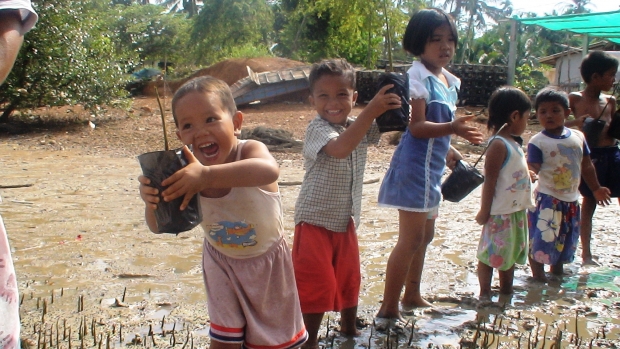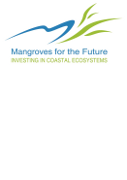Grants :: Small Grant Facilities :: Building a community network for managing mangroves and other coastal resources
Building a community network for managing mangroves and other coastal resources

Kids planting mangroves , Thailand © SSereepaowong , 2008
Objectives
This project aimed to rehabilitate and protect mangroves and coastal resources in Phang Nga Bay by engaging people from all sectors of society.
Background
The Phang Nga Bay Coastal Fishing Community Food Security Project was launched in 2000 by local developers and youth groups. Its original aim was to promote the participation of community-based organizations in managing coastal resources and strengthening their economic self-reliance. This small grant project sought to build on the achievements of the initiative.
Target beneficiaries
A total of 600 households from 19 communities, situated mostly in the middle part of Phang Nga Bay.
Outputs
- Creation of a coordinating network as a mechanism for managing mangroves and coastal resources.
- Preparation of a clear networking action plan, including events to commemorate mangrove protection efforts on 14 February each year.
- Development of action plans with activities in mangrove rehabilitation, forest surveillance, zoning, and species regeneration.
- Involvement of youth groups for wider learning and networking.
- Empowerment of women’s groups through strengthening and application of local knowledge on wild foods.
- Establishment of a community fund of US$5,000 for use by 13 conservation groups in 18 different communities.
- Protection of about 480 hectares of mangroves, and planting of an additional 15,000 mangrove trees.
- Establishment of a demonstration site for regenerating stocks of blue swimming crab (Portunus pelagicus).
- An increase in understanding of coastal resources management among residents of Phuket, with at least 5,000 people joining events organized by the network and 600 people applying for membership in the network.
Accomplishments and challenges
Thanks to the project the voices of communities were heard publicly in both Phuket and Phang Nga provinces. In several cases, communities were able to establish a communal forest conservation area in the face of unsuitable and destructive development projects. This success was attributable both to direct community involvement and to the influence of good conservation practices.
Contributions to cross-cutting themes
Gender equality
The project sought to promote participation by men and women equally. Women’s leaders were observed to be more open and more willing to talk about the conflicts or problems facing their communities.
Lessons Learned
Appropriately designed project activities can stimulate communities to take part in protecting coastal ecosystems.
Project Facts
Country
Location
Phang Nga Bay, Phang Nga and Phuket, Thailand
Topic
Duration
1st May 2009 to 30th Nov 2010
MFF Grant Amount
US$9,347
Co-financing Partner
The participating communities made cash and in-kind contributions of US$2,087 and US$30,167 respectively. The Thai Health Promotion Foundation contributed US$12,895 in cash.
Implementing Partner
Mr Pichet Parndam
Project Coordinator
Phang Nga Bay Coastal Fishing Community
39 Moo 3, Pa Klork, Thalarng,
Phuket 83110, Thailand
Tel: +66 89 8731051
Email: itfreefish@gmail.com
Related Publications

Building Community Network for Management of Mangrove and Coastal Resources
Author: MFF Thailand
Posted on: 4th Dec 2013
Category:
Size: 661 KB
